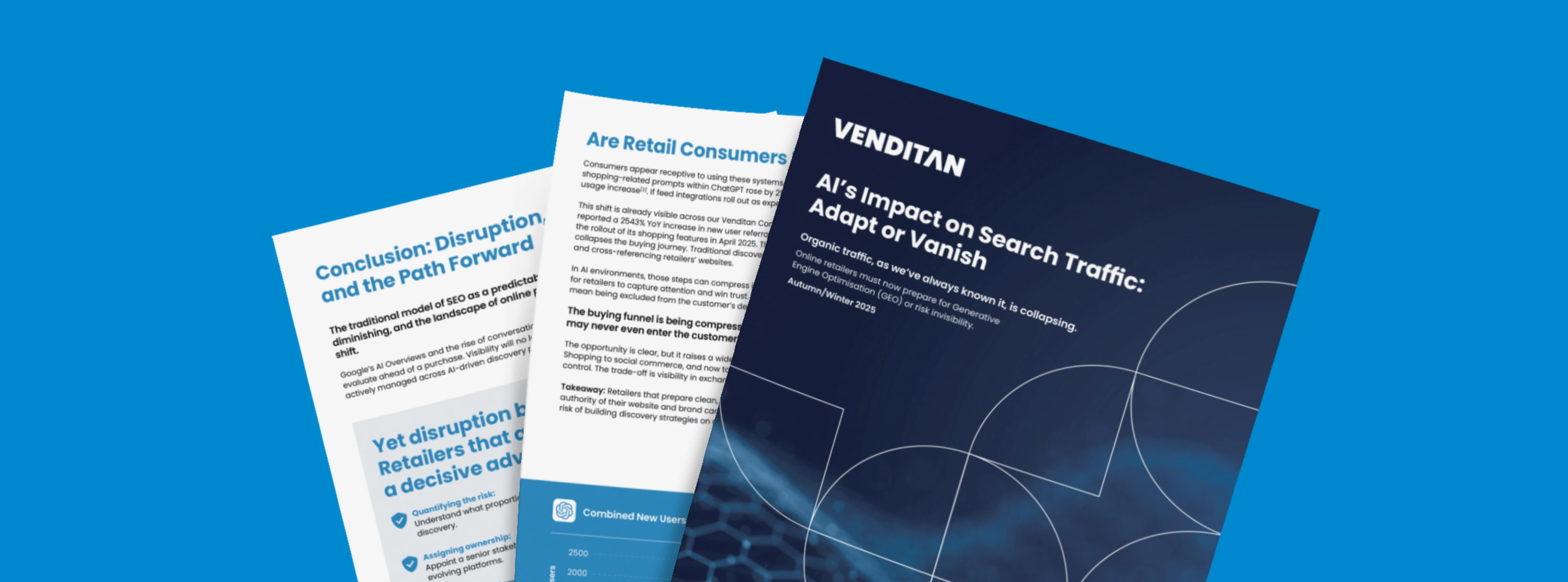The best eCommerce companies are constantly on the lookout for technology that could improve their processes and ChatGPT - the latest web-based technology to take the world by storm - should be on the radar of every business in the sector.
ChatGPT is an automated chat system produced by OpenAI, it responds to questions you ask with informative, clear answers. It is free to sign-up (at least for the time being) and we asked it to describe itself to help us write an introduction.
It responded: "ChatGPT is a large language model developed by OpenAI based on the GPT-3.5 architecture. It is designed to generate human-like responses to natural language prompts, allowing it to converse with humans in a variety of contexts. ChatGPT has been trained on a vast corpus of text data and is capable of generating coherent and contextually appropriate responses to a wide range of queries, making it a useful tool for tasks such as language translation, chatbot development, and content generation."
We then asked it to explain that again, this time, for a twelve-year-old child to understand: "Sure! ChatGPT is like a robot friend that can talk to people like you and me. It's really good at talking and understanding what we say. It has learned how to talk by reading a lot of books and things people wrote on the internet. That's why it can answer questions and talk about different topics. It's like having a really smart friend who can help you with anything you want to know!"
Now we’re clear.
How, then, should we be looking to utilise this in the world of eCommerce? Once we’ve got past asking it to tell us a joke and what the meaning of life is, there have to be some real operational benefits in something so powerful.
Let’s explore it in detail.

Help with procurement and management
By providing real-time insights and recommendations on various aspects of the supply chain, such as procurement, inventory management and demand forecasting, ChatGPT can help improve an eCommerce business’ supply chain management.
The technology can be used to help identify the right suppliers and negotiate better deals by analysing market trends, supplier performance, and product quality.
It can also analyse demand patterns and suggest optimal inventory levels to minimise sell-outs and excess stock.
With regard to logistics, ChatGPT can track shipments, monitor delivery times, and provide real-time updates on any delays or disruptions. Couriers themselves may also be able to use the technology to optimise their transportation routes, reducing costs and improving the delivery experience that they are able to offer.
All of the above can help to reduce operational costs for the eCommerce business, empowering them to offer better prices and sell on the benefits to their customers.
ChatGPT is the next generation of search engine
ChatGPT is the next generation of search engine. Conversational, and with personalised answers that truly answer your question, it provides the kind of experience that Jeeves dreamt of in the early 2000s.
This could prove to be quite the tool for eCommerce businesses.
Conversational search
In their current format, search engines require the user to input a phrase or question and browse a list of results, using their own intuition and the snippets of information to make a decision on which website to visit. They then need to scan that website to find what is often a sentence or two of information.
Does this not feel a little antiquated in comparison to the ChatGPT experience?
Ask a question and you will receive a personalised answer specific to your intent, in a natural language format. No need to trawl through websites to find that nugget of information that you need.
If you were in the process of reviewing your eCommerce strategy you could input questions as part of your ideation: What are eCommerce businesses focusing on in 2023? What do customers expect from an eCommerce website?
You would then receive personalised answers giving you key themes to go off and explore in more detail.
This is already happening
In February, Bing announced their AI-powered search engine. "Today, we’re launching an all new, AI-powered Bing search engine and Edge browser, available in preview now at Bing.com, to deliver better search, more complete answers, a new chat experience and the ability to generate content. We think of these tools as an AI copilot for the web. There are 10 billion search queries a day, but we estimate half of them go unanswered. That’s because people are using search to do things it wasn’t originally designed to do. It’s great for finding a website, but for more complex questions or tasks too often it falls short." - Bing
Complete answers to your complex questions could prove handy when you are researching and building a strategy for your eCommerce business.

AI-powered customer support
In Airkit’s 2021 ‘State of Digital Customer Experience’ report it was revealed that 64% of consumers ‘aren’t able to get help or solve their problems through their provider’s customer service.’
The benefits and drawbacks of chatbots in eCommerce have been discussed at great length already, with the general consensus being that the technology currently falls short of delivering a good customer support experience unless it is very carefully programmed to answer specific user queries in specific ways.
Could ChatGPT technology change that?
How ChatGPT could help elevate the chatbot experience
Chatbots powered by GPT could quickly and more accurately respond to customer queries, resolve issues, and even suggest relevant products based on the customer's preferences.
ChatGPT is designed to generate human-like responses, which could be useful for a more engaging and personalised support experience. GPT-3's response generation capabilities could be used to train chatbots to respond in a specific tone, be it friendly, formal or somewhere in between.
It offers improved Natural Language Understanding (NLU), which means that chatbots running on GPT-3 could understand user inputs in a more nuanced way. One of the current downfalls of chatbot technology is that it requires the user to ask questions in a specific, often grammatically correct manner for the question to be understood. They also tend to be designed to work in one native language, where ChatGPT can help support multiple languages by providing accurate translations when required - very interesting for multinational eCommerce businesses.
By fine-tuning GPT-3 to incorporate contextual information, chatbots better understand the context of a conversation and provide more relevant responses. This could be powerful in the event of a product recall or sudden demand for a product.
A more targeted chatbot system
Aside from an experience that offers a higher quality of interaction, ChatGPT-powered chatbots will also be able to deliver more specific and targeted support to customers.
For example, if a customer is browsing the PDP of a relatively technical product, then the chatbot can be given that context and prompt the customer after a period of inactivity, as that inactivity could be driven by a desire to understand more about the product they're looking at. The support would therefore be tailored to the product the user is browsing, delivering a more relevant experience.
Commercial opportunities
These chatbots could also be used to upsell opportunities to the customer. For example, with access to the customer’s order history, the chatbot can make an offer to motivate the customer to buy as part of the discussion/discovery process.
Accelerate your content production
ChatGPT can be a useful tool for product content production, helping eCommerce businesses to create high-quality content quickly and efficiently.
Product content
ChatGPT can be used to generate product descriptions based on the direction that you give it, such as product features and how you want them to be described.
To demonstrate this, we asked ChatGPT to ‘produce a product description for a four-seat, black, recliner leather sofa.’ In less than a minute, here is what it gave us back:
"Introducing our stunning four-seat black leather recliner sofa - the perfect addition to any living room! Crafted with the highest quality materials, this sofa offers unparalleled comfort and style.
With four spacious seats, everyone in the family can enjoy their own space to sit back, relax, and unwind. The plush, cushioned seats are upholstered in luxurious black leather, which not only looks sleek and sophisticated, but also feels soft and supple to the touch.
Each seat on this sofa is a recliner, allowing you to adjust the angle of the backrest to your liking. Whether you're watching TV, reading a book, or taking a nap, you can find the perfect position for ultimate relaxation. The recliners are operated via an easy-to-use lever, making it simple for anyone to use.
The sleek and modern design of this sofa is complemented by the black leather upholstery, which is both durable and easy to maintain. The sofa's clean lines and minimalist style make it a versatile choice that will complement any decor, from traditional to contemporary.
In summary, our four-seat black leather recliner sofa offers the perfect combination of comfort, style, and functionality. Invest in this luxurious piece of furniture today and enjoy many years of relaxation and enjoyment with family and friends."
Sure, it’s quite generic and assumes certain features that may not be true to the product you are looking to describe, but as a starting point, it provides a quality base of copy that can be edited into a description you are happy with.
There’s an SEO benefit, here. Google prioritises websites with unique and engaging copy and penalises duplicated content. Websites that stock products using boilerplate copy provided by a supplier can quickly differentiate their website by leveraging ChatGPT to make their product descriptions original.
Blog content
ChatGPT can also generate marketing copy for blogs, helping you to explore your product's benefits and giving you valuable research into topics you are exploring.
Benefits include:
- Topic generation, helping to generate a list of potential topics for your blog based on keywords or categories that you provide.
- Writing prompts, providing writing prompts or questions to help you brainstorm ideas for your blog.
- Content expansion, taking a draft of a blog post and expanding on the topic and suggesting additional points or ideas to include.
- Grammar and spelling, checking your writing for grammar and spelling errors, and suggesting corrections where necessary.
- Content optimisation, providing SEO input on blog content.

Help with code and technical support
While we would always recommend deferring to a professional with any technical queries, particularly regarding the code used to build your eCommerce website, we understand that not all eCommerce businesses have the resources to retain technical support services.
ChatGPT is no substitute for human expertise in this case, as there are drawbacks which we will discuss in the next section. However, it can prove to be a very useful first port of call for a marketer or business owner if they are struggling with a technical aspect of eCommerce.
ChatGPT can generate code based on a given specification or requirement. Marketers can provide a description of what they want the code to do, and ChatGPT can generate the code based on that description. This could be used to help put together product feeds, schema and shortcode for WYSIWYG CMS editors. This is also useful for debugging, and identifying errors in code with suggestions provided on how to fix the problem.
Due to the conversational and personalised experience that is provided, ChatGPT is a great tool to use if you need a technical concept explained to you. You can even ask for simple terms, and the language will be simplified.
The drawbacks of ChatGPT in eCommerce
Clearly this technology provides plenty of opportunity for eCommerce businesses to refine their processes and elevate their work, but ChatGPT must be considered in balance with the potential drawbacks that come with using automation and AI.
Overreliance
ChatGPT is so easy to use, and provides such high-quality content and guidance, that you could quickly become over reliant on the technology to drive your content, strategy and research. This could lead to complacency in the workplace with those using the technology failing to develop their skills, particularly in creative positions.
Accuracy
For the most part, we found ChatGPT to give accurate responses to queries.
However, when asking the system to explain step-by-step processes for tasks that we know how to complete, such as setting up Google Analytics 4 for a client, we received under-explained and incorrect guidance that went against the information we would give to our clients.
There are many reasons why this may be the case, such as failure to grasp the question (although we have found it to be shockingly good at this) - however, it is important to note that ChatGPT was built on a knowledge base that only runs up to early 2021, with some access to the internet being slowly introduced as of March 2023. Google Analytics 4 was only announced in October 2020, so it only had a small amount of information to pull from when answering this question for us. The world moves quickly and the history gap is certainly a problem.
Vague, samey copy
If ChatGPT is mass-adopted by businesses, we could quickly end up in a situation where we’re all putting out the same vague, computer-generated marketing material.
We found the technology to be incredible at making suggestions and giving you fresh ideas to explore, but we would definitely recommend that you steer away from simply copying and pasting the generated text to use on your website.
If you are looking to use ChatGPT to accelerate your copywriting process then it is important that you give the system as much guidance as possible so that it can accurately write a piece to your scope. Even then, you must alter the text to make it your own.
Future penalisations
On the same theme, we do not yet know how Google is going to respond to the inevitable rise in AI-generated content but we have to suspect that this will be on their roadmap.
We predict that in the years to come, Google will develop their crawler to be able to detect the consistencies in AI-generated content, and penalise websites that give off these signals accordingly.
Final thoughts
We strongly encourage all readers to sign up for free and have a play around with ChatGPT, if for no other reason than it is good fun. We hope this piece has outlined some of the serious ways in which ChatGPT could be leveraged by an eCommerce business but, at the same time, it is worth considering the drawbacks and limitations that come with artificial intelligence generally.
Our recent posts
Keep up to date with the latest news and insight from the team at Venditan
-p-2600.webp)








.webp)
